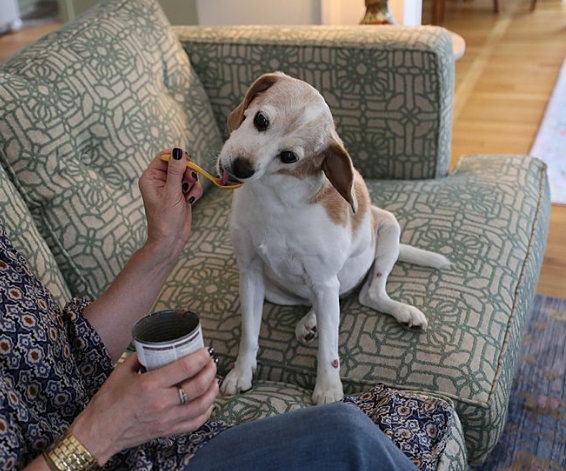She saw the note as soon as she opened the front door. On the mat, a piece of lined paper, folded. It was about her dog. “To Brisket’s mother,” it read.
Marilyn Pratt knelt. Panic rising, she felt she might vomit.
She had felt responsible for Brisket even before they met, two months earlier, in an Ocean State Job Lot parking lot. He was 8 pounds of fluffy white Maltipoo just arrived from Texas on the back of a truck. She was a preschool teacher and director hungry for a relationship with a dog.
But Brisket wasn’t what the rescue agency had described. He was not good with people. He was not good with other dogs. Walking around her Brighton neighborhood, with Brisket lunging and growling and biting, Pratt, 27, felt ashamed, overwhelmed.
When the trainer arrived, the first of several, Pratt cried. “I was in this delicate place where I loved him more than anything, but I didn’t want to sign my life away for the next 15 years.”
Then, the note. Pratt assumed it was from a judgmental onlooker. She feared what it would say, “You need to get rid of him.”
She unfolded the paper and relief replaced fear. “I would love to help,” wrote a neighbor who had struggled with her own dog. “Brisket . . . is a cutie!”
In 2019, there are two parallel and very different dog stories. In one, we’re in what could be called a golden age of dog ownership. Dogs are being wooed by condos and apartments and hotels. They’re guests at yappy hours. They take enrichment classes such as “urban herding,” “canine cross-training.”
But there’s a sadder story, too, one that gets less publicity, because each person thinks it’s happening only to him or her. It involves dogs who arrive at their new home with intense — unexpected — behavioral or emotional issues and upend their owners’ lives.
They bite strangers or their owners. They go berserk when they’re left alone. They attack other dogs.
The pooch that was supposed to bring companionship instead isolates, causes friction. Walks are spent shouting warnings. “Stay away! My dog’s not friendly!” The dog park is out. So is Thanksgiving.
The problem is growing for several reasons, including the very basic fact that dog ownership is on the rise. At the end of 2016, nearly 40 percent of American households had one or more dogs, the highest rate since the American Veterinary Medical Association began measuring in 1982.
In Boston, the number of registered dogs has more than doubled since 2012, from around 2,700 then to more than 7,000 this year, according to city data.
On top of that, thanks to the Internet, people are now buying or adopting dogs on the basis of a cute picture and a bio that may or may not be real, or written in code. “Pixie is super protective of her owners!” can be less an indication of loyalty than stranger aggression.
About 15,000 dogs a year come to Massachusetts from out of state, according to Terri Bright, director of behavior services at MSPCA Boston. Some rescues are bused or trucked in, others may be from breeders that charge thousands to fly dogs to their new owners, with their first meeting occurring at the airport.
Those who work with dogs emphasize that any dog can have a behavior problem — rescues, puppy mill dogs, breeder dogs. A dog who was not properly socialized as a puppy, or experienced a trauma or physical abuse, is more likely to be fearful, anxious, and aggressive.
But a 15-year trend toward finding homes for every dog, and in part a turn away from euthanasia for even those with intense challenges, has led to an increase in the number of difficult dogs up for adoption, said Bright.
As saving a dog becomes ever more revered, she said, “People want the dog with three legs, the dog with the story, the dog that needs them most.”
Those dogs, she said, are not always a good fit with urban life, with brunch on the patio.
“I’m not saying these dogs shouldn’t be saved. I’m saying that it’s hard to have a dog who was rescued from a Korean meat market now living on Beacon Hill.”
Some people who find themselves suddenly related to a difficult dog surrender the animal, an oft-emotional decision that can lead to feelings of failure and shame. But sometimes as early as day one, owners already feel so responsible — or love the dog so much, despite challenges — that they do what it takes to make their pets the best dogs they can be.
They spend thousands on training. They rearrange work schedules. They repeat a mantra heard from others who’ve been there: “It gets better.”
“I’m my dog’s emotional support animal,” Natalie Kassirer, an illustrator and artist from Leverett, said cheerfully, describing Darcy, a schnauzer mix with severe separation anxiety.
Kassirer and her boyfriend won’t travel if they don’t have a sitter whom Darcy feels comfortable with, she said, adding: “She also has problems with other dogs, which we’re working on. But she’s my little angel baby and I’m so glad she can come to work with me.”
Lizzy Flanagan, a real estate agent in Cambridge, has also rearranged her life around her dog.
She used to host dinners and themed birthday parties, festivities that largely stopped with the arrival of Tildy, a 20-pound ginger-and-white beagle with floppy ears, soulful eyes, and a wiggly gait, who, at the same time, barked, lunged, growled, and snapped when she saw another dog, a baby stroller, a kid on a scooter, a runner, or basically anyone, said Flanagan.
“I had many fewer visitors,” she said, “and those who did come were family members and people who understood the importance of not petting her.”
The scope of the challenge faced by owner-dog teams can be seen in the wait times to meet with local animal behaviorists. Tufts Animal Behavior Clinic is booking into fall, and MSPCA Boston is making appointments for January (although both organizations will fit in emergency cases sooner).
“I worry about the patients and clients when it is so difficult to get an appointment in a timely way,” said Stephanie Borns-Weil, head of Tufts Animal Behavior Clinic at Cummings Veterinary Medical Center at Tufts University.
A common fear among owners is that if they give up the dog, who will love it?
It was that very worry that led Michele Martin, of Somerville, to extend a foster dog’s planned 9-day stay by a few days, then weeks.
Jessica was a treeing walker coonhound who went wild when she saw a person or a dog, not an easy animal to be with.
“No good applications were coming in for her,” said Martin, who works in marketing and business development. One was from a bunch of housemates who planned to leave Jessica tethered in the yard. In an effort to find an owner, Martin made her an Instagram page. “jess_thefreckledhound.”
“I was trying so hard to get that girl adopted by the right family,” she said. But no one stepped up.
It was after a weekend of hiking that the dog made her move. Martin was in the bath, Jessica next to the tub. “All of a sudden she exhaled,” Martin said. “Like she finally felt she was home.”
Source bostonglobe.com



Posting Komentar
Posting Komentar